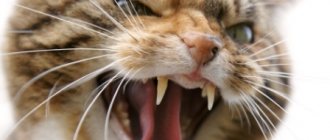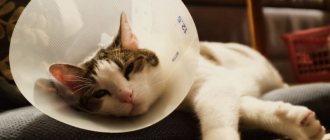general information
Let us note that some behavioral problems, as a rule, occur after surgical castration, since, despite the simplicity and speed of execution, it is a serious stress for the animal’s body. And the older the cat, the more pronounced this stress factor increases.
After castration, a kitten can run and play again within three to four hours. But an “aged” cat is physically unable to recover from the consequences of the operation at such a speed. So you shouldn’t be surprised when your pet, which you just brought from the clinic, sleeps “without its hind legs” all the time. It’s just that at this time his body is recovering, and there is no need to interfere with it.
By the way, how long does it take for an animal to fully recover from anesthesia? It is believed to take about three to four hours. After another 10-14 hours, the animal’s behavior becomes almost normal, but until then it almost always sleeps. Let us repeat that this is a completely normal phenomenon, and therefore there is no need to worry.
A particularly long period of recovery from anesthesia is typical for castration of cryptorchids. Let us recall that cryptorchidism is a pathology in which during puberty the testes do not emerge from the abdominal cavity into the scrotal sac of the scrotum. Such cats can only be sterilized through a rather complex abdominal operation. Only in very rare cases is it possible to stimulate temporary descent of the testis into the scrotum, when the organ is “caught” and standard surgical castration is performed.
Wound care
In summer, the chances of catching a dangerous infection are much higher, since warmth is a haven for bacteria. To avoid infection of your pet in the summer, he needs to undergo a 5-day course of antibiotic treatment.
It is also necessary to purchase a special collar for the cat that prevents the animal from licking itself. It would seem that licking wounds is characteristic of animals and usually helps them. But not in case of castration. A hard cat's tongue can remove stitches and introduce infection into the wound.
The suture area can be treated with hydrogen peroxide, brilliant green or Levomekol ointment. Every morning and evening, check the cat's groin area and check for bleeding or other suspicious phenomena.
In what cases does the duration of recovery from anesthesia increase?
Firstly, we need to immediately make a small clarification. Initially, castration (even surgical) was considered a fairly easy operation that did not require general anesthesia.
But now, under pressure from the public and animal rights activists, sterilization of cats (with the exception of very young animals) is almost always carried out under general anesthesia. Accordingly, the frequency of long-term post-operative “hibernation” in pets is only increasing from year to year. In addition, the following reasons may influence the animal’s prolonged “weakness”:
- Characteristics of drugs , their compatibility with each other (provided that several drugs were used). Thus, some specialists in the recent past often used a combination of chlorpromazine and rompun. This mixture gave excellent results when it came to anesthesia. The problem was that some animals took a very long time to recover from this combination of drugs.
- Age of the animal . Once again, an old pet is seven times more likely to die under general anesthesia when compared to a young animal or kitten. It is for this reason that old pets are strongly advised to be neutered solely for medical reasons, when the operation helps cure the pet of some serious disease.
- Pet's condition, stress level before surgery . Practice proves that cats operated on in a clinic and left by the owner there (so that veterinarians can monitor the animal’s condition) come to their senses much faster than “domestic” pets. Obviously, a cat that is subconsciously experiencing anxiety will quickly come to its senses to respond to possible threats from the external environment.
Alas, not before every castration the animal is subjected to a comprehensive veterinary examination, but in vain. For example, it may turn out that something is wrong with the cat’s blood clotting system, but surgical operations are generally prohibited!
In addition, for some systemic pathologies and suspected cancer, general anesthesia is not always desirable, as it can cause a worsening of the pathological process. Moreover, diseases of the cardiovascular system can even be deadly for a potential castrato. In the best cases, the pet will take a very long time to recover from anesthesia, and in the worst cases, it may not recover from it at all.
The conclusion is simple. If you decide to castrate your pet, be sure to take him to the veterinarian. Let the specialist take all the tests and decide whether the operation is safe. This can save you from a lot of problems in the future.
Sterilization and castration of cats
Castration of a cat means deprivation of furry testes. There is no need to assume that castrated cats are deprived of all the joys of life. On the contrary, after castration, the chances of dying from urolithiasis (UCD), which occurs in many cats due to hormonal fluctuations and metabolic disorders, are sharply reduced. Operated purrs live much longer than their relatives due to the stability of hormonal levels, they no longer suffer from sexually transmitted infections, and their behavior improves.
Sterilized cat - with spermatic cords tied. The method is controversial, because after this procedure the cat continues to mark the territory and your shoes, and is able to hunt cats without procreation. It is a mistake to think that a sterilized cat suffers from the inability to procreate and lack of sex. After all, even in the wild, the male still has to win his right to the female, and not everyone succeeds in this.
When does hibernation indicate something is wrong?
Thus, a cat sleeping peacefully after surgery is the norm; in most cases, it is absolutely common. There's no need to panic. But still, in some cases it is necessary to call a veterinarian, and as soon as possible.
We list some situations in which a visit to the veterinarian will not be superfluous:
- The breathing of a sleeping animal is unstable, intermittent, hoarse. Such signs may indicate both problems with the cardiovascular system and pulmonary edema. In any case, the sooner the veterinarian arrives, the better for your pet.
- All visible mucous membranes become bluish, slightly swollen, and cool to the touch. These signs also indicate serious problems with the animal's cardiovascular system.
- The cat has been sleeping for more than seven to eight hours, and during all this time there have been no signs of awakening.
- Try pinching or pricking your sleeping pet with a pin. In cases where more than five hours have passed since the operation, but no reaction is observed in response to your actions, it would not hurt to call a veterinarian.
Preparing for surgery
Having decided to undergo surgery, owners must clearly understand that castration is a surgical operation that requires adherence to a clear algorithm of actions. Having chosen a suitable veterinary clinic, before the operation it is necessary to take tests: blood, urine, a smear for sexually transmitted infections, and give the cat a cardiogram. Get vaccinated in advance, about two months in advance, or you can postpone them for a while.
It is important to approach the operation responsibly and not spare money on procedures and examinations, because the health and life of your pet depends on its successful implementation.
After anesthesia, the cat will sleep for several hours, so you need to take a carrier and a blanket to the veterinary clinic; during narcotic sleep, the body temperature drops and the pet may freeze.
How to ensure a comfortable awakening for your pet?
So, you or your veterinarian have made sure that the cat’s “hibernation” is not caused by anything serious, and therefore your pet will soon wake up. What needs to be done so that waking up does not become severe stress for the operated pet?
You need to follow the simplest rules (equally suitable for pets who have undergone other operations):
- If possible, the cat should be brought home after the procedure. In familiar and comfortable conditions, your pet will recover much faster and will be less nervous.
- It is advisable not to place your pet on a bed, sofa or anything similar. It may be impossible to predict the behavior of an animal after general anesthesia. The cat may jerk sharply and fall. Considering that his coordination of movements at this time is very far from perfect, with special “luck” he can even break his neck.
- Place a bowl of clean drinking water in close proximity, but so that it is in direct view. If the bowl stands close to the cat's bed, but on the other side of his head, he may simply not see the drink.
Remember! Sleeping soundly after castration is completely normal in most cases. Be patient and wait until your pet wakes up.
Sterilization and castration of cats
Often, cat owners confuse two inherently different concepts: “castration” and “sterilization,” naively believing that castration is “when the bells are cut off for cats,” and sterilization is the same as castration, only in cats. Both of these procedures can be performed on both male and female cats. Neutering a cat involves either ligating the ovaries or removing the uterus while leaving the ovaries. A cat can “flow”, experience urges and still make love to the cat, however, without the threat of becoming pregnant. Well, it’s just like with people.
Castration of a cat involves removing both the uterus and ovaries. After this procedure, cats do not go into heat, hormones do not fluctuate, the risk of cancer is reduced, and the function of the ovaries is transferred to the adrenal glands.
Prevention of complications
Pet owners are most often interested in how the cat’s wound healed and how long it lasted. Recovery time largely depends on the owners themselves.
If the animal has a predisposition to kidney and heart diseases, it is recommended to give it a maintenance dose of medication without waiting for symptoms of the disease. Before choosing a drug, you should consult with the surgeon who performed the operation, as well as with your animal’s attending physician.
To reduce stress, the cat should be placed in a separate room and its contact with children and other animals should be limited. A bowl of food and water should be placed nearby. To relieve anxiety, you can give your pet the drug Kot-Bayun.
All information posted on the site is provided in accordance with the User Agreement and is not a direct instruction to action. We strongly recommend that before using any product, you must obtain a face-to-face consultation at an accredited veterinary clinic.











